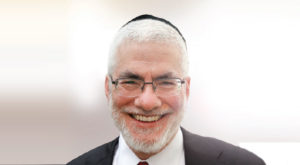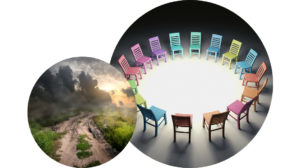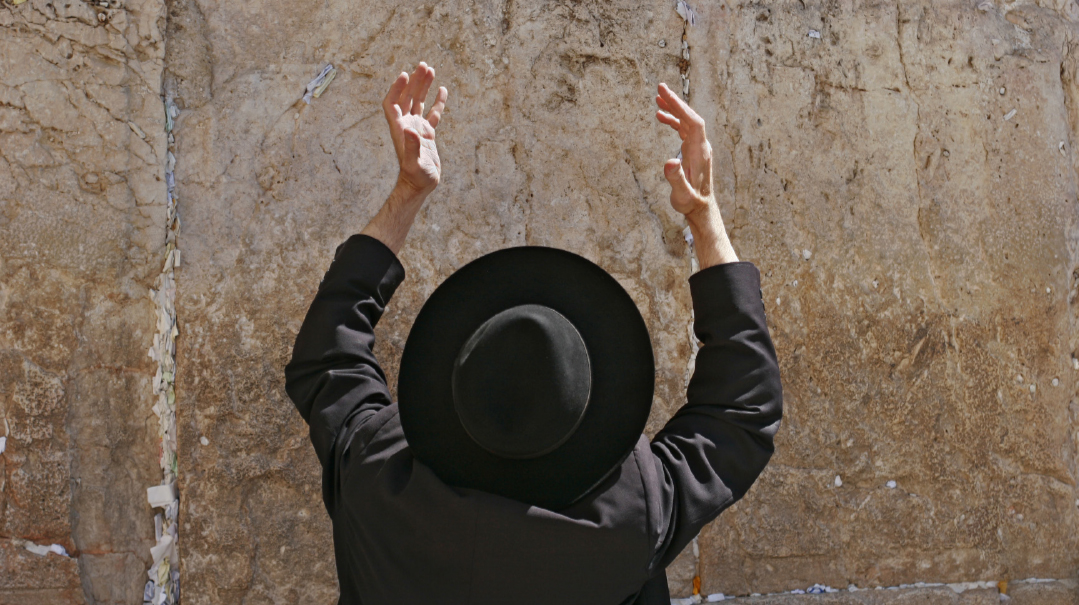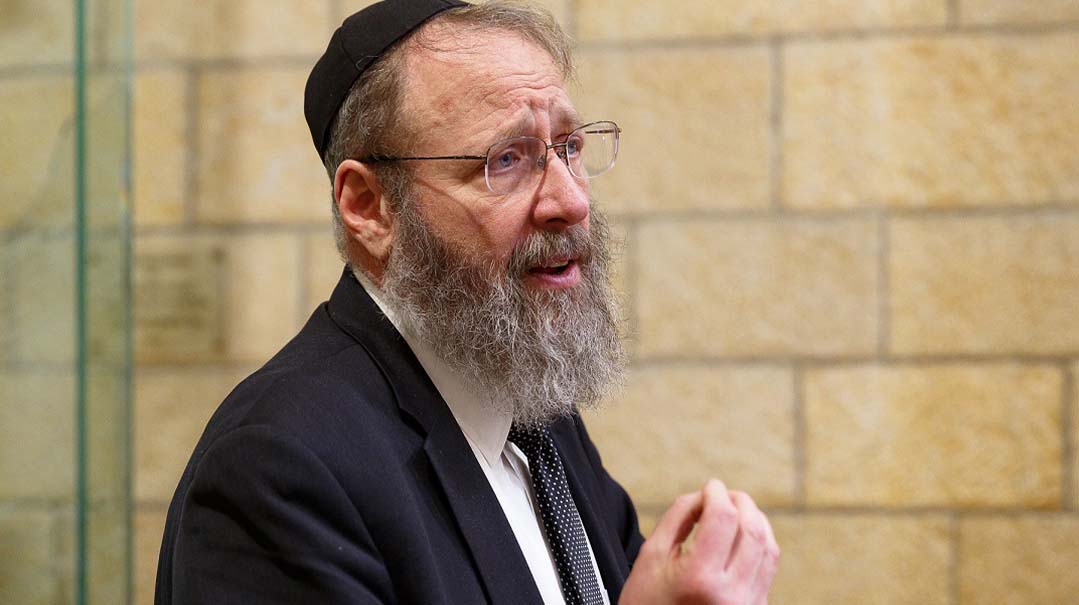Would We Want It Any Other Way?

Survive the frum grind without getting crushed
I
recently heard a speaker urging people not to get stuck in the toil of everyday life, of work and career, of pursuing gashmiyus, and instead to make our lives more spiritual and Torah-focused. Yet I couldn’t help but bristle with a bit of defensiveness as I thought of my husband who works day and night as a primary-care physician. As the primary breadwinner in our family, he contends with a grueling schedule — and I know that in many families, both parents work equally hard. Working to support our families and the religious lifestyle we live is intense, demanding, and unrelenting.
I often think back to the time when my husband decided to leave his yeshivah in Eretz Yisrael and continue his learning in the States. One of his rebbeim shared an observation: “I had a talmid once who went to that yeshivah in America. He then decided to go to medical school. I guess he was really into gashmiyus.” An uncanny, unintentionally prophetic comment of sorts, since my husband did end up going to medical school a number of years later. But trust us, it wasn’t for the gashmiyus. Baruch Hashem for the many frum doctors of the world who go into medicine for the most altruistic reasons, alongside their desire to support their families.
It’s not about having the extra money to build one’s dream house or pay for the yearly Succos in Israel. This is simply about what it takes to pay the bills and raise a frum family in 2019. We don’t mean to allow the grind of everyday life, of working exceptionally hard day in and day out, to overwhelm, but it seems it’s inevitable these days in order to survive.
So what does the frum grind look like for so many in our communities? Parents are putting in long hours on the job — typically with both parents working. We generally have large families, including children with various educational, emotional, and medical needs. There are communal demands on our time, as our shuls, schools, and organizations need us to volunteer our time and energy in order to function. And of course, there are constant financial demands. Each month seems to have its own additional expenses. We go from camp shopping to back-to-school shopping, to Yom Tov expenses, to seasonal clothes shopping. In addition to the tzedakah requirements during the times of Rosh Hashanah, Purim, and Pesach, there is dinner season for ads and yearly tzedakah campaigns for our local and national institutions. Other financial demands unique to our way of life include myriad religious expenses, day school tuition, Shabbos and Yom Tov preparation, kosher food for large families, seminary and yeshivah costs, paying for simchahs and the accompanying gifts, and supporting married children. Not to mention that residents of large Jewish communities on both the East and West Coasts deal with exorbitant mortgages in frum neighborhoods, even for more simple homes. And have we forgotten the question of saving for retirement, or even saving for higher education for our children?
In addition to all this, we’ve got a little communal issue with consumerism. There’s no doubt that societal expectations have gone through the roof. So we need to do all of the above, and in style. Pressure to conform, to maintain our image, and to present a certain way so that we and our children feel good about ourselves wreak havoc on our credit card bills. Today’s “normal” necessitates significant salaries for all these things, yet the pressures apply equally to all. Braces, summer camp, high-end clothes for each season for every child. Car leases, updated homes and furnishings, and exciting vacations. Most of us are just trying to look and be normal, to raise our kids normally, and if this is the new normal, then we have to work even harder (or go into more debt) to have it all. Yesterday’s wants have morphed into today’s needs. And yet for the average family, the math simply doesn’t add up. Fuzzy “orthonomics,” indeed.
Like a hamster on its wheel, we are running and running to attain, consume, and provide. While our intentions are no doubt l’Sheim Shamayim, there seems to be no other alternative. Sometimes it feels we really are that caricature of the man who vows he will never say at the end of his life he regretted not spending more time at the office.
Most significantly, our race on the hamster wheel has the likely potential to impact stress levels, shalom bayis, and mental and physical health — of both ourselves and of our children. When our mental health is compromised and we are silently suffering, trying to muster up that love and enthusiasm for Yiddishkeit and raising our children to do the same, it’s a challenging feat. Judaism and its requirements (especially around Yom Tov) then feel like an insurmountable burden.
The goal here is not to whine about how hard it is to be a Yid. The goal is to give voice to a struggle that exists in our communities: the frustration many experience in valiantly trying to keep up with the demands inherent in our lifestyle. Let’s acknowledge it and simultaneously think about how we can alleviate the burden. While I offer no solutions to the tuition crisis or the real estate crisis, or how to magically quadruple your income, I can propose some coping strategies and mindset shifts that can help us deal with the challenges.
First, we must ensure that our basic needs are being met. This means adequately fulfilling our needs for sleep, nutrition, and exercise. It also includes finding time to prioritize ourselves when it comes to appropriate recreation and relaxation, to reconnect to our inner selves and interests. Our human need for belonging and connection cannot be ignored either. And while it’s important that we keep our tanks filled physically so we can continue to serve as providers and caretakers, it’s equally necessary to keep our spiritual tanks filled. Nurturing our connection to Hashem and making it a priority to keep our Yiddishkeit meaningful and personal are essential in keeping us going so we can live purposefully and give to those around us.
We also have to keep the tanks of our loved ones filled. There is no excuse for neglecting our relationships — whether with our spouse, our children, or other important family members — due to our hectic lives. Everything we are doing is in fact for them. More than ever, Shabbos is a lifesaver, as many families only sit down for meals together over Shabbos. It is crucial to be on the lookout for opportunities to reconnect with our loved ones by making time for them. Even small moments and gestures show our loved ones that they are a priority, even if time is scarce.
Next, We Literally need to breathe, to focus more on restoration and well-being in our day-to-day lives. Incorporating mindfulness practices and deep breathing into our schedules forces us to jump off the wheel and stop. We need to develop a sense of appreciation and presence. We are not machines but vulnerable human beings, and we have to work at maintaining equilibrium so that we can be healthy in order to continue to give. Such exercises need not take large chunks of time, but rather can be practiced throughout the day to restore some inner peace and tranquility.
Regarding material pressures, we can all cultivate a sense of “enough-ness” in our lives. What that means is establishing “sameiach b’chelko” as our mantra. There are many areas in our lives that may feel lacking, especially when we observe our neighbors and see how those exact areas seem like they’re fulfilled. Stepping back and practicing gratitude, recognizing that “I have enough,” that “This is enough,” and “I am enough” can fill the void and remind us that we really have what we need, even though we may want more. Making efforts to live with a little less and curtail excessive spending are other ways we can work on developing enoughness in our lives.
Finally, when the more stressful cycles of the Jewish calendar arrive, or when we complain about the financial demands of living a frum life, let’s recognize that truly, we wouldn’t want it any other way. All societies have their own sets of problems, and while we can work on alleviating the stress and addressing our systemic issue, at the same time we should remember that we are blessed to belong to such a remarkable people and nation. Our lives are enriched from the gifts of belonging to our community. We are blessed to be the am hanivchar with the Torah as a moral code and guidebook for life. We are fortunate to have a system of wisdom and support to help us navigate the challenges that we encounter by virtue of being human. If we can be mindful of our blessings, alongside incorporating some mindset shifts and conscious strategies, we can soften the grind.
Alexandra Fleksher is an educator, a published writer on Jewish contemporary issues, and an active member of her Jewish community in Cleveland, Ohio.
(Originally featured in Mishpacha, Issue 785)
Oops! We could not locate your form.










